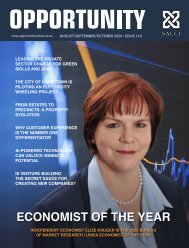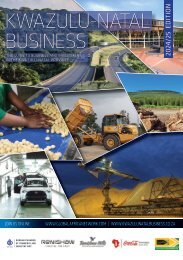Eastern Cape Business 2017 edition
The 2017 edition of Eastern Cape Business is the 10th issue of this highly successful publication that, since its launch in 2006, has established itself as the premier business and investment guide to the Eastern Cape Province. The Eastern Cape enjoys an abundance of natural and human resources, as well as established industrial infrastructure that drives the economy of the province. This includes three ports and two industrial development zones which are home to a wide range of manufacturers and exporters. The 2017 edition includes an in-depth look at the province’s two Industrial Development Zones, a focus on skills development and investment climate information from the Nelson Mandela Business Chamber and the Border-Kei Chamber of Business.
The 2017 edition of Eastern Cape Business is the 10th issue of this highly successful publication that, since its launch in 2006, has established itself as the premier business and investment guide to the Eastern Cape Province. The Eastern Cape enjoys an abundance of natural and human resources, as well as established industrial infrastructure that drives the economy of the province. This includes three ports and two industrial development zones which are home to a wide range of manufacturers and exporters.
The 2017 edition includes an in-depth look at the province’s two Industrial Development Zones, a focus on skills development and investment climate information from the Nelson Mandela Business Chamber and the Border-Kei Chamber of Business.
You also want an ePaper? Increase the reach of your titles
YUMPU automatically turns print PDFs into web optimized ePapers that Google loves.
The Masisizane Fund was established in 2007 as<br />
an initiative of the Old Mutual Group and with a<br />
mandate to contribute measurably to job creation<br />
that in turn helps eradicate poverty in South Africa.<br />
The Fund focuses on creating clusters of partnerships<br />
that work together toward the common goal of<br />
establishing sustainable farming ventures operating<br />
the formal value chains.<br />
In 2013, the Masisizane Fund adopted a Cluster<br />
Development approach in order to address the<br />
agricultural challenges faced in the rural <strong>Eastern</strong><br />
<strong>Cape</strong> and to ensure socio-economic transformation.<br />
Clustering small scale farmers to ensure that<br />
they benefit from economies of scale has its own<br />
challenges and nuances.<br />
Some of these challenges, particularly in remote<br />
rural areas, include deficient infrastructure, long<br />
distances from markets, skills deficiencies and social<br />
dynamics among others. It is only when one is<br />
immersed in the work in these areas that the<br />
challenges that lie ahead become visible and they<br />
can be daunting. It is for these reasons that the<br />
Masisizane Fund has based their work on the<br />
following principles:<br />
• Building a foundation and establishing trust<br />
among the cluster of farmers and partners.<br />
• Creating the necessary infrastructure by building<br />
capacity, providing financial assistance and<br />
networking opportunities.<br />
• Putting systems in place starting with steering<br />
committees and ongoing support, mentoring<br />
and training.<br />
• Developing partnerships and incorporating the<br />
technical support provided by government in<br />
the form of extension services.<br />
• Working with government and other financial<br />
partners to leverage the available financial<br />
resources.<br />
WE WERE FACED WITH THE<br />
FOLLOWING AGRICULTURAL CHALLENGES<br />
IN THE RURAL EASTERN CAPE:<br />
• How do we develop rural communities where<br />
there is no infrastructure or capacity?<br />
• How do we assist the local farmers to establish<br />
sustainable farms/businesses, creating work<br />
opportunities and improving food security?<br />
• How do we bring disconnected and small farming<br />
ventures operating in the informal markets into<br />
the formal value chains, local and even global?<br />
• How do we ensure that small farmers gain<br />
economies of scale, which is one of the critical<br />
success factors in modern farming?<br />
In an attempt to provide answers to these questions,<br />
the Masisizane Fund established a flagship pilot<br />
project in the Alfred Nzo and Harry Gwala<br />
districts. These areas are characterised by high<br />
levels of unemployment, low economic activities<br />
and investments, dependency on social grants and<br />
a high number of unskilled labourers. With the aim<br />
of bringing about economic transformation with a<br />
legacy effect in these areas through agricultural<br />
investment, a total of 1600 hectares were planted<br />
with soya and dry beans in the Matatiele,<br />
uMzimkhulu and Nkwazini areas during the<br />
2014/15 season. The severe drought that affected<br />
South Africa and Southern Africa had an impact on<br />
the production of this pilot project, which as a result<br />
produced yields significantly below expectations,<br />
generating revenue of R2.86 million with 20%<br />
distributed to funded entities as dividend and land<br />
use fees.


















